The 16 Myers-Briggs® Personality Types and How Easy it is for Them to Share Their Feelings
Feelings are an integral part of our human experience, yet expressing them can be a wildly different experience depending on your Myers-Briggs® personality type. Some find it a breeze to share their inner world, while others would rather swallow a handful of thumbtacks. I’ve seen this hesitance or willingness to share feelings vary so drastically between the types and be the spark for many arguments between couples and family members. Perhaps one spouse shares feelings with ease, while the other keeps theirs under lock and key. Over time, the differences between how we share feelings can result in rifts between friends, couples, and parents and children. With that in mind, I decided to survey my email list and social media followers to see what the connections there were between personality type and emotional sharing. 1,478 people responded to my survey about type and the ways we express and receive love so today we’re going to take a look at the results! So let’s begin.
Not sure what your personality type is? Take our personality questionnaire here. Or you can take the official MBTI® here.

Table of contents
- The 16 Myers-Briggs® Personality Types and How Easy it is for Them to Share Their Feelings
- ISTJ – The Detective
- ISFJ – The Protector
- INFJ – The Mystic
- INTJ – The Strategist
- ISTP – The Vigilante
- ISFP – The Virtuoso
- INFP – The Dreamer
- INTP – The Prodigy
- ESTP – The Daredevil
- ESFP – The Champion
- ENFP – The Visionary
- ENTP – The Trailblazer
- ESTJ – The Captain
- ESFJ – The Defender
- ENFJ – The Mentor
- ENTJ – The Director
- What Are Your Thoughts?
Estimated reading time: 18 minutes
The 16 Myers-Briggs® Personality Types and How Easy it is for Them to Share Their Feelings
ISTJ – The Detective
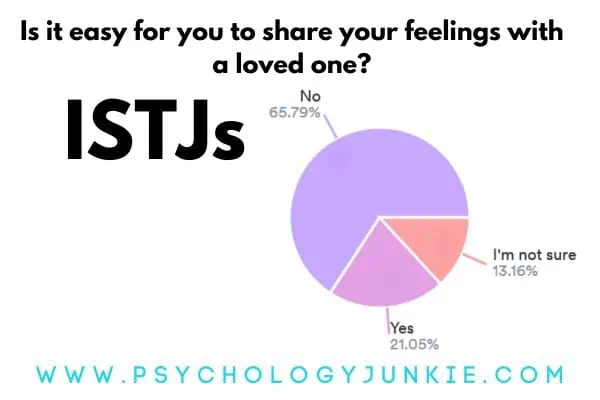
It may surprise many, but ISTJs actually have very deep feelings. They just don’t necessarily feel like sharing them most of the time. I remember an ISTJ I knew once saying to someone, “I love you, but it’s none of your business.” I remember hearing that same sentiment brought up in a book about type that I read later (and I’ve scoured my bookshelf many times without having luck finding the book, sadly).
You see, ISTJs filter information through Sensing first and foremost. What is real? What is provable? What has their past experience taught them? Then, of course, comes Thinking. What’s logical? What’s objective? What is their unbiased, detached opinion? By the time information gets through to their feeling side, often they’ve objectified many of their emotions and put them aside because they don’t seem “sensible” or “logical” enough. Many ISTJs struggle to share their feelings because they worry they won’t make sense, that they won’t be pragmatic, or that they are showing some kind of unnecessary bias or emotional hypersensitivity that perhaps they’ll regret revealing later. However, as I said at the beginning, this doesn’t mean ISTJs don’t have feelings. And the truth is, many ISTJs have very deeply-held emotions, values, and sentiments that they privately observe and treasure on their own time. You might find that your ISTJ friend or partner cries during movies that relate to a specific experience they’ve had (they were in the military, for example, so they now cry during war movies). You may also find that ISTJs have very deep personal causes that they care greatly about. But getting an ISTJ to openly share their feelings with you can be a difficult task, and many require a great deal of trust and comfort before that can happen.
Find out more about ISTJs: 7 Things ISTJs Experience in Childhood
ISFJ – The Protector
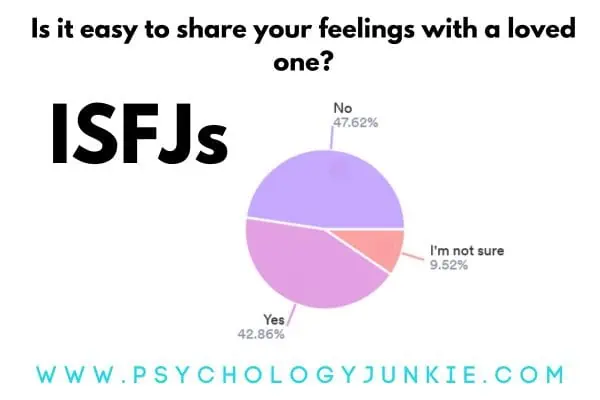
ISFJs felt a little less uncertain about sharing their feelings in general, but in the survey there was still some hesitance. 47.62% said it wasn’t easy to share their feelings with a loved one, while 42.86% said it was easy. Still 9.52% said they weren’t sure whether it was easy or not to share their feelings. When ISFJs explained their thoughts more on this subject, they talked about how it depended on the types of feelings they had to share. If they were wanting to share positive feelings, that was fairly easy, but if they had negative feelings or emotions to express, there was a lot of hesitance because they didn’t want to disrupt the harmony or negatively impact people. Many ISFJs said that they tended to get stuck in a state of analysis-paralysis rather than revealing their negative emotions. They would try to make sense of things, question their own interpretation, and then wonder how it would emotionally impact other people to share what they felt. However, when it came to sharing more positive feelings, ISFJs enjoyed sharing affirmation, praise, encouragement, or gratitude with others.
Read This Next: The Flirting Styles of the ISFJ Personality Type
INFJ – The Mystic
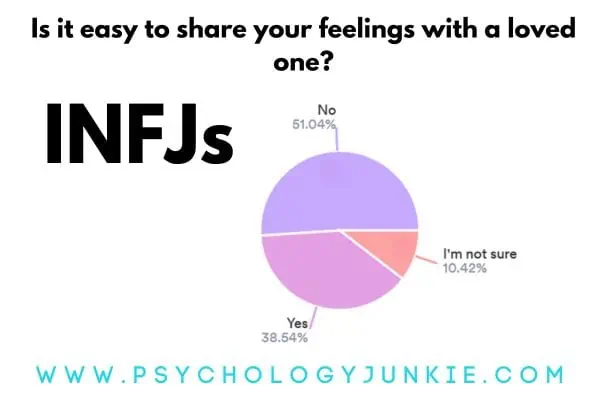
More INFJs felt it was difficult to share their feelings than felt it was easy. 51.04% answered “No,” to the question “Is it easy to share your feelings with a loved one?” while 38.54% answered “Yes.” When INFJs receive information, they first tend to process it through Intuition. They consider the underlying meaning of the information, what patterns exist in it, and what it means for the future. Then they process information through their feeling side, but this feeling side is primarily interested in how other people are affected. INFJs are gifted with rich empathy that allows them to grasp how other people will be emotionally influenced by various situations. But when it comes to sharing their own feelings, INFJs can feel a little bit of stage fright. What if what they share will negatively impact someone else? What if what they share puts them in a position of vulnerability? Many INFJs have experienced a lot of misunderstandings in life as people have failed to recognize or appreciate their intuitive insights. This common feeling of being misunderstood can make INFJs feel even more hesitant to really express how they feel for fear of being continually misunderstood.
Find out more about INFJs: 10 Extremely Annoying INFJ Pet Peeves
INTJ – The Strategist
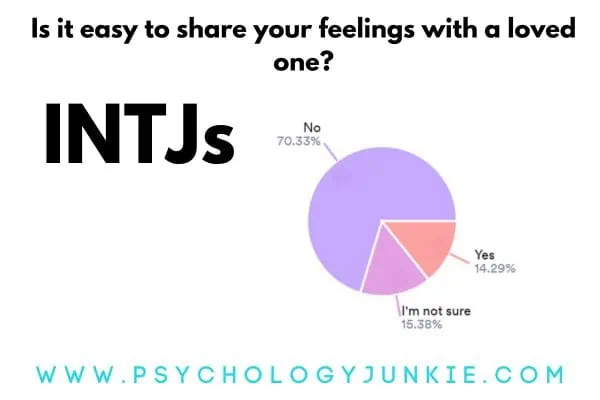
INTJs find comfort in the realm of strategy and long-range planning rather than emotional disclosure. It’s not that they lack feeling, but sharing isn’t straightforward or always seen as useful. Many times INTJs feel the intensity of their feelings more richly when they’re alone, yet when others come into the picture they shift into problem-solving or productive mode. This is because the function they tap into when they are with others is Thinking; it’s about problem-solving, offering advice, figuring out logistics, strategy, and logic. The feeling side of the INTJ is introverted and comes more into the arena when they are alone and can process without distraction. Many times INTJs feel that if they share their feelings with others they are opening up some very vulnerable, private part of themselves that they don’t feel entirely confident about. They need to have absolute trust in the person they’re talking to and a sense that their vulnerability won’t be used against them.
Find out more about INTJs: The Underrated Kindness of the INTJ Personality Type
ISTP – The Vigilante
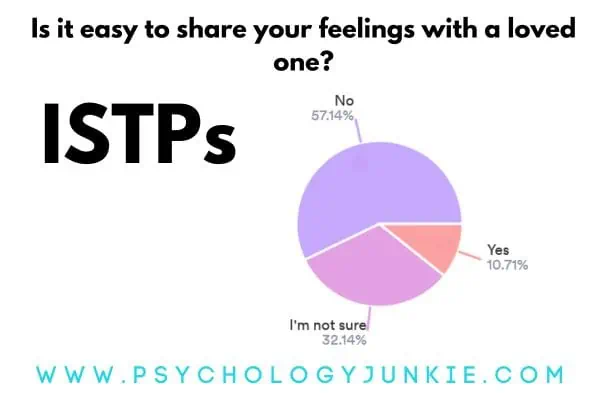
The ISTP’s preference for action over words tends to extend to their emotional expression. They’re the type to fix something as a way of showing they care, rather than explicitly state their feelings. Many ISTPs struggle to even know what they’re feeling from moment to moment, focusing instead on analytical thoughts or actionable experiences. This is because Introverted Feeling, the function that processes inner feelings, values, and motivations, is the 8th function of the ISTP and can seem out of reach and muddled. ISTPs do have feelings and they do want to have warm, harmonious relationships with other people, but they can feel uncertain and insecure in situations that call for a lot of emotional sharing.
Discover more about the ISTP: 24 Signs That You’re an ISTP, the Vigilante Personality Type
ISFP – The Virtuoso
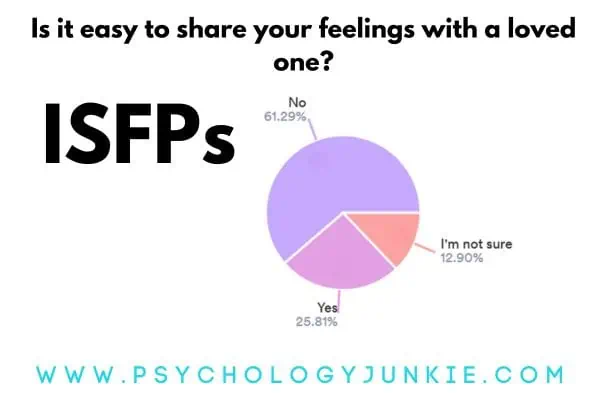
ISFPs embody sensitivity and authenticity, yet their internal world is carefully guarded. An ISFP sharing feelings is a gift of trust – one that is bestowed selectively. They are not the types to openly share what they are feeling in real time; rather, they observe, analyze, reflect, and deal with their feelings in a more independent way. The more ISFPs can spend time alone, the more clarity they can develop around their feelings. Unlike Feeling-Judging types, FPs tend to understand their feelings through introspection rather than talking. That said, when ISFPs have a great deal of trust in a person they are likely to share their feelings; not for someone else to analyze (please don’t dissect an ISFP’s feelings for them), but to connect with another person and open the groundwork for understanding and empathy.
INFP – The Dreamer
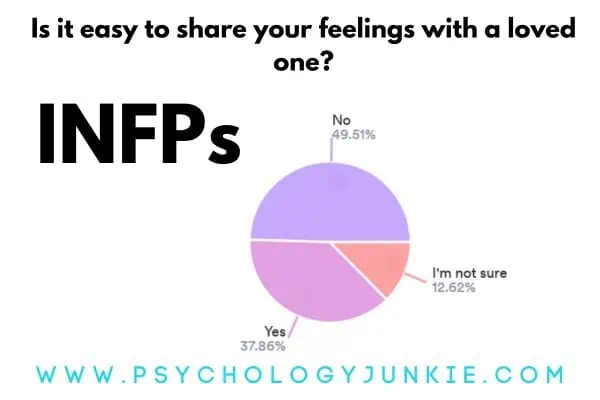
INFPs may be full of intense emotions but verbalizing them is a personal trial. Because INFPs are Introverted Feeling types, they often choose to process and understand their feelings alone rather than through verbal expression. Many INFPs would rather write about their feelings or create some form of artistic expression around them than talk about them in-depth. The exception is when an INFP has a very close friend or family member who seems to understand them; then an INFP may open up more readily. Or the INFP may open up about their feelings if by doing so they believe they can further a cause or belief that’s important to them. When an INFP does share their feelings, they typically aren’t looking for someone to analyze them, piece them apart, or give a bunch of logical advice. They typically want solidarity and a sense that they are accepted and seen for who they really are.
Find out more about INFPs: The Lonely INFP: How to Cope When You Feel Alone
INTP – The Prodigy
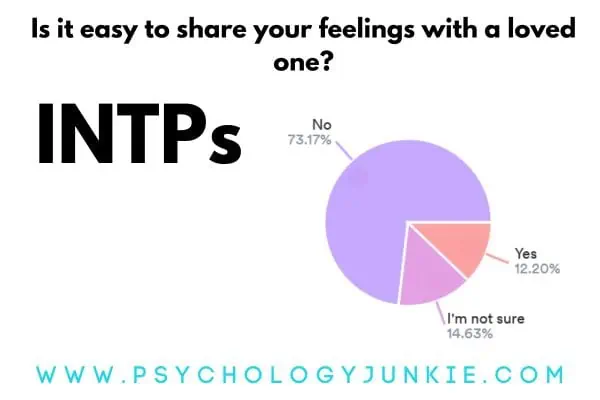
For INTPs, logic reigns supreme, and emotional expression can seem like a foreign and confusing language. An INTP might struggle to translate their abstract thoughts into the verbal realm, preferring to keep their emotions neatly compartmentalized. It can be difficult for INTPs to really single out and find words for what they feel. Their minds are wired to understand logical connections and theoretical explanations more than inner emotional realities. The Introverted Feeling function, which processes inner emotions, desires, and motivations, is the 8th function in the INTP’s cognitive function stack. This makes it hard to access and can make INTPs feel a little foggy and uncertain when they have to express their emotions. It’s not uncommon to ask an INTP how they feel about something only to have them stare quietly into the distance for a long time as they mentally try to grab at feelings and emotions that seem blurry and far away. They need a lot of time and patience in this process and many people simply lose patience and brush them off.
Find out more about INTPs: Are INTPs Rare? The Truth About the Prodigy
ESTP – The Daredevil
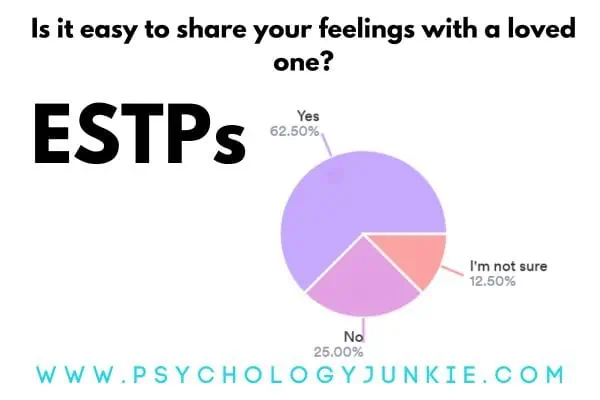
Dynamic and pragmatic, ESTPs deal with the present. They share feelings as directly as they confront challenges – straightforward and without preamble. ESTPs enjoy warm connections and sharing of positive emotional moods. They’re good at gaining rapport with people, charming them, and creating a sense of camaraderie or playful competition. Where ESTPs struggle is in dealing with negative emotions or more deep, private motivations and feelings. For example, dredging up feelings with a therapist can often be a particular challenge for the ESTP because they have to access their Introverted Feeling side, which is the 7th of their 8 cognitive functions. They often need a lot of time, space, and patience as they try to tap into the deeper motivations and feelings that guide them.
ESFP – The Champion
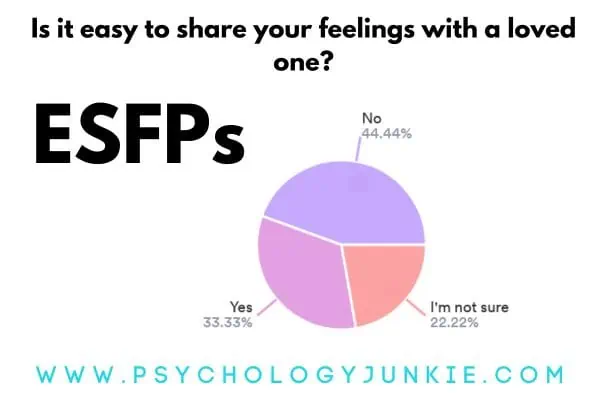
The gregarious ESFP loves to connect and share good times, but when it comes to deeper emotions, they might pause. They’re not interested in dredging up their deeper feelings for just anyone. There must be a real purpose behind it and they need to really care about the person in question. ESFPs are much more pragmatic and no-nonsense in person than many feeling types appear to be. They show the world their Sensing side; what’s real, what’s actionable, what experiences are available. They also show their Thinking side; what makes sense and what’s logical. Their feeling side is introverted, which means it’s not as natural for them to immediately share what they’re feeling in real time. You’re more likely to see the results of their feeling side in their actions. For example, an ESFP who cares about the homeless may help out at soup kitchens, spread the word in neighborhoods where there are a lot of homeless people, and provide a no-nonsense, authentic presence around people they care about. If an ESFP is in the habit of sharing their emotions with you it means they have developed a level of trust with you where they feel comfortable doing that. But this should not be taken lightly!
Find out more about ESFPs: 24 Signs That You’re an ESFP – The Champion Personality Type
ENFP – The Visionary
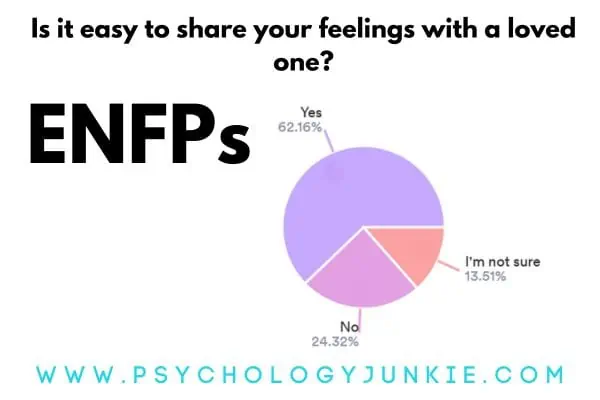
ENFPs are natural sharers; it’s an extension of their enthusiasm for life. They’ll share their feelings, hopeful for a reciprocal exchange. “Every emotion is a story waiting to be told – why keep it to myself?” said one ENFP who completed my survey. Many ENFPs share their feelings as a way to connect with others, create an atmosphere of authenticity, and form richer relationships. They often weave their feeling side into their intuitive side; blending their inner passions with possibilities they want to create in the world.
For example, an ENFP, driven by their empathy and passion for inclusivity, might initiate a storytelling project that amplifies the voices of refugees. Envisioning a platform that bridges narratives across various media—blogs, podcasts, and visual arts—they work to create a vast catalog of personal experiences. Through this creative endeavor, the ENFP harnesses their feeling side to promote empathy, challenge stereotypes, and advocate for equality, demonstrating the profound impact of combining emotional insight with innovative action.
Find out more about ENFPs: The Courage of the ENFP Personality Type
ENTP – The Trailblazer
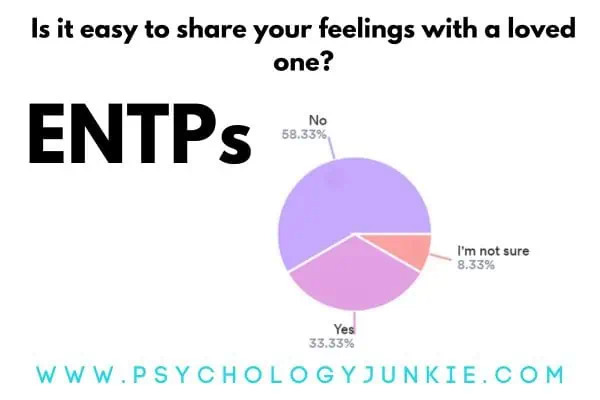
ENTPs can effortlessly dissect theories and ideas but feel more guarded when it comes to sharing their innermost feelings. They’re often blessed with an easy charm, a sense of humor, and a quick ability to intellectually spar with others. And when it comes to the world of feelings, they’re often gifted with understanding other people’s emotions; sensing the mood, generating rapport, and keeping the conversation going. Despite this natural inclination towards understanding others, sharing their own emotions can be a hurdle for ENTPs. They may feel that their feelings are too complex to articulate, or worry that they won’t make sense to others. As one ENTP put it, “It’s easier to analyze someone else’s feelings than my own.” Many ENTPs struggle to sort out negative feelings unless they “vent”, but afterwards they may rethink what they said and feel differently about it. Because of this, it’s important for ENTPs to have people they can vent to without having to worry that those people will take everything they’ve said too seriously.
Discover more about ENTPs: 10 Things You Should Never Say to an ENTP
ESTJ – The Captain
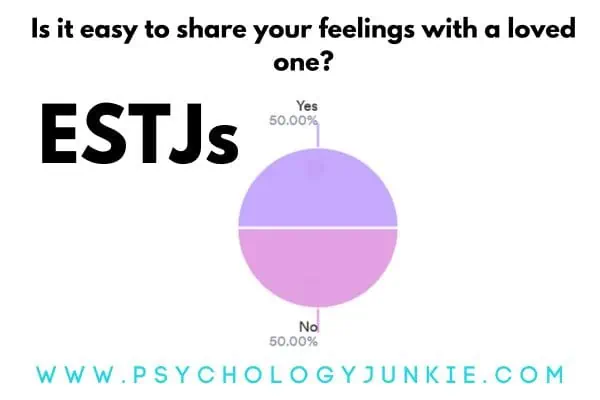
ESTJs see the world through a lens of order and logic, which can make emotional sharing feel out of place or untidy. A typical ESTJ may consider sharing feelings as a secondary function to maintaining a well-run system, preferring practicality over sentiment. But ESTJs are extroverts and will usually share their opinions, thoughts, and feelings fairly quickly as they arise; but they don’t dwell or ruminate. Most ESTJs won’t want to spend a long time picking apart their feelings and they’re unlikely to trust their feelings, choosing instead to trust the world of logic, facts, and tried-and-true formulas. But don’t take this as a sign of insensitivity; ESTJs do care, but they’re likely to show it through actions more than words.
Find out more about ESTJs: 24 Signs That You’re an ESTJ Personality Type
ESFJ – The Defender
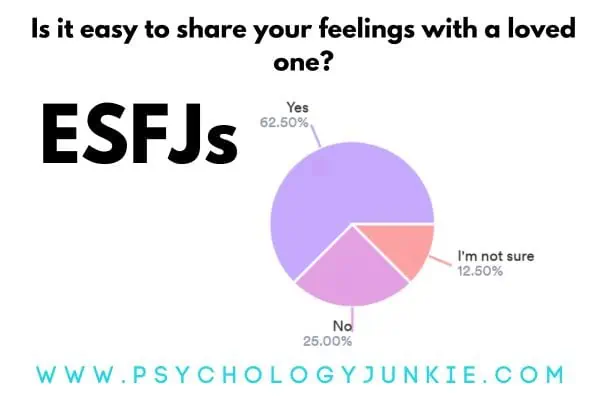
Harmony is an ESFJ’s priority, so their feelings are often expressed in a way that strengthens connections and supports others. One ESFJ responded to my survey with the words, “I share my feelings to nurture relationships, to help other people feel comfortable sharing their feelings.” As Extraverted Feeling types, ESFJs naturally express their emotions in real-time. They process their feelings out-loud; and if they have to keep them shut in it can be hard for them to make sense of them. By expressing their feelings they hope to find clarity, support, solidarity, and mutual understanding. Sharing of feelings is the only way to real connection with ESFJs, so they prioritize it a great deal and will often feel uncertain in situations where the other person keeps their feelings too guaded.
Find out more about ESFJs: 24 Signs That You’re an ESFJ, the Defender Personality Type
ENFJ – The Mentor
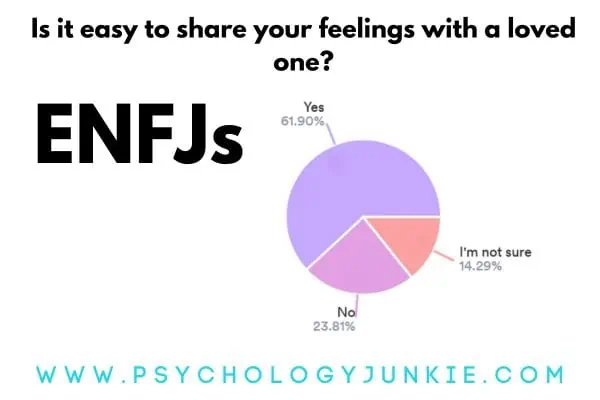
ENFJs are open to sharing feelings if it fosters growth or understanding. As Extraverted Feeling types, they process their feelings best if they can express them in real-time and verbalize them. As they speak they tend to experience many “aha” moments and insights that help them to make sense of what’s going on for them. In the same way, ENFJs enjoy hearing other people share their feelings. Listening to people talk about their emotions helps them to be feel close and connected; to guide, support, and empathize with someone else. That said, ENFJs also don’t want to be anyone’s emotional dumping grounds. They need to feel like their feelings are appreciated and reciprocated, rather than just being a sounding board.
Find out more about ENFJs: 24 Signs That You’re an ENFJ, the Mentor Personality Type
ENTJ – The Director
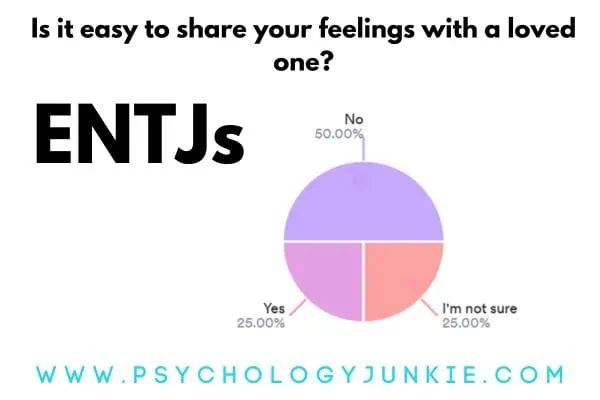
For the ENTJ, also known as The Commander, emotions often take a backseat to logic and efficiency. ENTJs tend to perceive emotions not as inherently valuable insights, but as data points to be analyzed and categorized. This approach allows them to maintain a strategic focus on their goals, often objectifying their feelings to ensure decisions are rooted in what they consider to be objective reality. “Feelings have their place, but they don’t control the game,” one ENTJ revealed in my survey. This objective stance stems from a deep-seated distrust of emotions, viewed as potential obstacles to clear, unbiased decision-making. ENTJs worry that if they allow their feelings to take precedence, these emotions could introduce bias, leading to decisions that are not only unfair but also inefficient. Consequently, ENTJs often adopt a rational approach to emotional expression, carefully filtering their feelings through a lens of logic before allowing them to influence actions or decisions. Of course, over time this approach can lead to a slew of unprocessed and repressed emotions that bubble up in fits of anger or sadness at times. This is why many ENTJs would be helped by processes like journaling, talking to a counselor, or taking small, manageable bits of time to express how they feel without judgment. This keeps them away from repression and helps them to make sense of what’s going on inside so that they can avoid projecting unprocessed feelings onto other people.
Discover more about ENTJs: How ENTJs Say “I Love You”
What Are Your Thoughts?
Is it easy or difficult for you to process your feelings? Do you have any tips for people with the same personality type as yours? Let us and other readers know in the comments!

Subscribe to Our Newsletter

Want to discover more about personality type? Get the inside scoop with Susan Storm on all things typological, along with special subscriber freebies, and discounts on new eBooks and courses! Join our newsletter today!


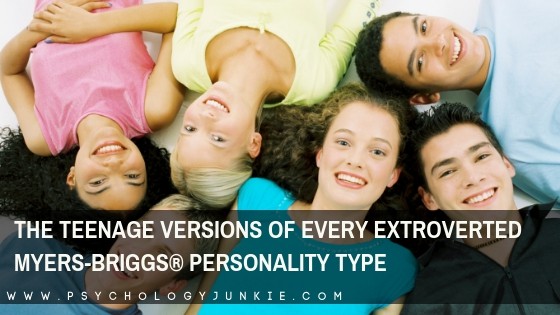






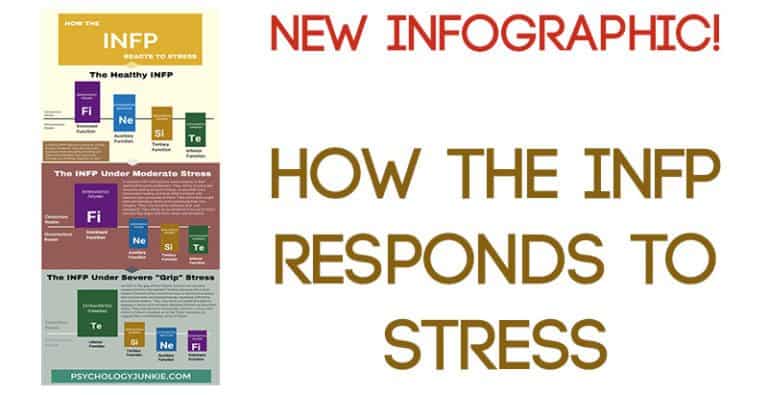
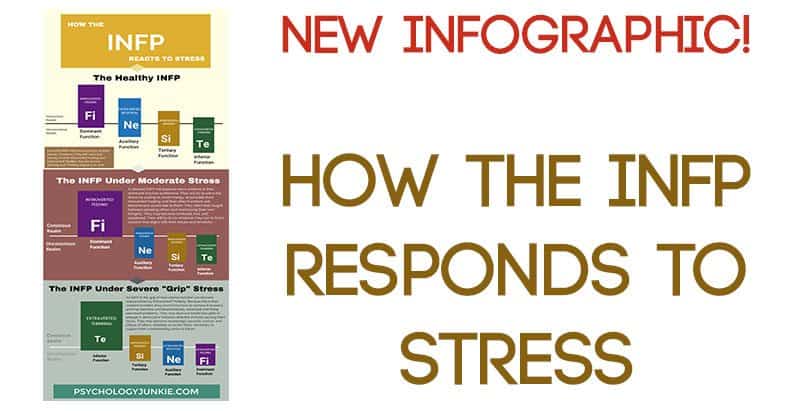


Here’s my take (INFJ, 4w5 sx/sp here):
I note the vast majority say ‘no’ more than 50% of the time. No one even says it is easy in any degree close to the ‘nay’. Therefore I suspect a current cultural climate and American culture dominating here.
Side point- east would really need awesome is an assessment on how IMPORTANT each type believes it is to share/discuss feelings.
This is such a great article. I want to figure out which Myers-Briggs my kids are most likely to be, but they are young, 9 and 6. Is it possible to figure that out? Does it change with time? I feel I could adapt my parenting and meet their needs better if I could understand their inner life better. Thanks for all the newsletters! They are awesome!
My thoughts are in the line of still trying to sort myself out. I collected all the ones that sound a great deal like me. One thing is for sure and true: I am not, according to this, an XNFP and I’d prefer them to stay out of my life or only be in it, in small doses. Mind you, they sound lovely, but they also sound like a nightmare of emotional content overflowing on themelves and others, all day long. I can’t take that.
ISFP, however, is one of the ones that sounds like me. So, it’s not FP altogether. And, it’s definitely not P. I think its N and P together. I have learned I am not an ENTP, also. The more I learn about ENTP the more I am sure I am not one. ESTP and ISTP both have something that I am quite a bit alike though.
I have INFJ, too. So it’s not just N and it’s definitely not NF. Therefore, yeah, N and P together and maybe F and P together.
I need to look into those. N and P together and F and P together and what sort of thing they make a person like.
This is spot on for me. Most of the time I like to appear to be a stoic robot, but internally, I’m really not. I feel very deeply sometimes, but I’m very private and I keep it to myself. I mull over all my feelings in my head. If I’m showing emotion, it’s most likely because I’m angry. I keep the more sentimental emotions hidden away.
“Many ISTJs struggle to share their feelings because…they’ll regret revealing later.”
I struggle with mental health issues sometimes but it isn’t stigma that prevents me from talking about it. It’s my need for privacy and knowing that if I do, I will likely regret sharing something I can never take back. There’s no Ctrl-Z when you open up to someone.
“You might find that your ISTJ friend or partner cries during movies that relate to a specific experience they’ve had”
Yeah, I actually cried a bit watching a sitcom once because the kid got upset and yelled out something so relatable to me. But if I’m gonna cry, I’d rather be alone for that.
General observation: I noticed all of the introverted types were more likely to respond “No” than “Yes,” while it was about half and half for the extraverted types.